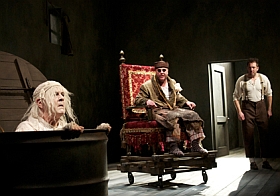Endgame At Steppenwolf Is Beckett Done Right
By Julienne Bilker in Arts & Entertainment on Apr 20, 2010 9:40PM

photo of Francis Guinan, William Petersen and Ian Barford by Mark Campbell
Endgame takes place in a post-apocalyptic world (or perhaps in the mind of Hamm, the crotchety would-be King of this microcosmic, bizarre realm), in a nonspecific, dank, grey room with towering walls and two teeny, barred windows reachable only by ladder. Surrounded by a dark void (in the form of an empty orchestra pit between audience and stage), the setting could be a fortress, a prison, a mental hospital, an exceptionally depressing nursing home, or, well, nowhere. As with practically everything else in the play, the metaphors are endless, and making a specific decision is neither required nor desirable. Beckett certainly makes you think - but there is a looming danger of overthinking. Be careful, or your brain will explode.
Trapped in this farce, as one character calls it: Hamm (William Petersen), a blind invalid who is overly reliant on painkillers; Clov (Ian Barford), his presumably adopted son/manservant who is no longer able to sit down; and his parents Nagg (Francis Guinan) and Nell (Martha Lavey), who live in barrels, wax poetic about the ever-elusive "yesterday," and only appear Oscar The Grouch-style when summoned by their tyrannical son. Nagg and Nell are physically incapable of escaping their casks, while Hamm and Clov have a screwy co-dependent relationship reminiscent of Waiting for Godot's Vladimir and Estragon. As the title suggests, the play is about "the end" in all senses of the word - from the very start, we are told, "It's finished." One might wonder, if it's already finished, then why is there a play? In one of the script's several quirkily self-referential moments, Clov asks the same question: "What is there to keep me here?" "The dialogue," Hamm replies. For all of its symbolism and analogies, Endgame communicates with the audience in a fairly blunt manner. "The end is in the beginning and yet you go on," Beckett reminds us. We all know we'll die one day, and yet we keep living. Yes, on its face, it's disheartening subject matter. But as Nell reminds us, "Nothing is funnier than unhappiness."
As we mentioned earlier, a play with this many layers can be the mental equivalent of downing a 36 ounce slushie in two minutes, which is why it's so important that the text be handled exactly right. Director Frank Galati's ensemble tells the story as simply as possible, as opposed to slogging around in the subtext, while creating richly dimensioned characters. All four perfectly-cast actors have moments that will stab you in the heart, make you consider your own mortality (along with your own endgame) and remind you how ridiculous it all is. Though our morbid sense of humor made it easy for us to keep laughing even as we contemplated the inconsequential nature of our own existence, we urge even those of you without a taste for such starkly black comedy to give it a try. It's a real treat to see Beckett done this well. And besides, what's 75 minutes of your life?
Endgame, through June 6. Steppenwolf, 1650 N. Halsted. Tickets $20-$77.